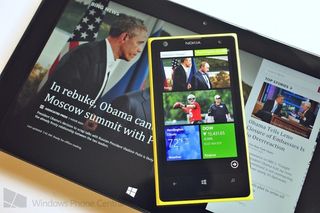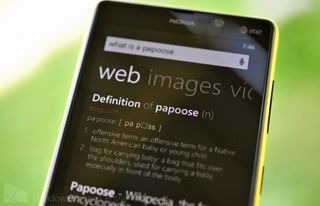You might love Bing and not even know it - a look behind the scenes

The search engine that was first launched five years ago by Microsoft in 2009 as a competitor to the giant multinational corporation, Google, now has a global markets share of 5.62% across desktops and 2.64% across mobile devices. Bing is currently ranked as the world’s third most popular search engine and sits behind Yahoo’s 8.22% and Google’s massive 83.04% desktop search engine market share.
However, Microsoft is not just trying to get users to visit their own website – they are playing the covert operations game and acting as the backend for many services you and your friends may use. In fact, you might be loving Bing and not even know it.
Yahoo Search
The same year that Bing launched, Microsoft and Yahoo announced that they would be making a deal to use Bing as the backend for Yahoo’s own search engine. You can see the partnership for yourself by heading over to Yahoo and typing in any search query your wish; when you scroll to the bottom of the page, you will see “Powered by Bing”.
Consider this idea when looking at Bing’s market share for desktops, while Bing is in third place and Yahoo is in second place – they both use the same backend. We could actually combine Yahoo and Bing’s market share to get 13.84%, so while people might not actually be heading to Bing’s website – they are still using the Bing search engine when they visit Yahoo.
Facebook Search
If you are enjoying the world’s largest social network, Facebook, then you might also be enjoying Microsoft’s Bing search engine from time to time. The massive networking site reported in December that over 1.23 billion active users engage in the network every single month.
When you use Facebook’s search bar to search the web for content or query questions such as “Sushi restaurants my friends like”, the results are being pulled from Microsoft’s Bing API. Facebook’s entire website uses Bing search results to power discovery, along with maps displays. If you are using Facebook, there is a good chance that you are at some point, using Bing.
Apple's Siri
One of the most interesting places to find Bing in action is within Apple’s ecosystem. Despite Microsoft and Apple’s differences, the Cupertino based company uses Bing to power search on its various range of electronic devices. When Apple had a fallout with Google in June 2013, they announced that they would be switching over to Microsoft Bing as a replacement.
Get the Windows Central Newsletter
All the latest news, reviews, and guides for Windows and Xbox diehards.

Do you have friends who are major Apple fans, but contest Bing as a reputable search engine? Feel free to let them know that any of their devices with iOS 7 or higher are using Bing to power Apple’s digital personal assistant, Siri. That is right; one of Apple’s most famous software features is powered in-part by Microsoft’s Bing.
Windows and Xbox
Moreover, of course, we cannot forget that Bing is now integrated into every facet of the Microsoft ecosystem itself. Whether you are using an Xbox, Windows 8 PC, or Windows Phone device, you are probably interacting with Bing from time to time.
Microsoft first introduced Bing search onto the Xbox 360 dashboard to allow consumers to search across the web and various applications for specific forms of content including music, video, and games. When the Xbox One launched this past November, we saw the same ability integrated into the console, but with a bit more polish using Kinect. Simply say “Xbox Bing” and you can easily search for various forms of content; the algorithm has also evolved, so saying, “Xbox Bing – I want to watch a Sci-Fi movie from the 1960s” will bring up relevant results for you to sift through.
With Windows 8’s first update – Windows 8.1, a new feature known as Smart Search was introduced. Smart Search allows users to quickly view search results from across their device and the web simultaneously. For example, from the start screen of a Windows 8.1 machine, I can type “Daft Punk” and hit the ENTER key, then not only am I shown music tracks on my device by Daft Punk, but I am also shown the top web results in relation to the topic searched.

Windows Phone
Lastly, we can clearly see that Bing is tightly integrated into Windows Phone; it may not be the same subtle approach we have seen in other services, but merely another example of Bing’s presence. Those who are Windows Phone users know that Bing cannot be change as the default search engine when pressing the hardware search button. Those who are looking to escape from Bing are forced to download a standalone Google search app – the only official application he company has released on Windows Phone.
In addition, the aforementioned Bing Smart Search within Windows 8 is set to land on Windows Phone with the upcoming Windows Phone 8.1 update later this year. For more information about the upcoming Windows Phone 8.1 update and to learn more about the Bing software additions coming soon, you can checkout our full list of features by clicking here.
The Solution
Bing has been around for five years now and is available in 40 languages around the globe, but market share still feels thin. Amazon’s Alexa subsidiary currently ranks Bing as the twenty-third most popular website in the world and the tenth most popular within the United States.
While Bing is out in full force in its attempts to attack Google with campaign’s such as “Bing it On”, their battlefields are not just the most obvious of choices. Microsoft has gone strategic with Bing and has used their influences and connections to encourage companies such as Yahoo, Facebook, and Apple to use the search engine behind the scenes.
Microsoft is well aware that the word “Bing” carries a slightly negative connotation with it. At times, Bing seems to be lobbed into the same piles as Vista, Kin, and Microsoft Bob. In essence, blatant bias against Microsoft’s search engine may be the reason that providing backend support for services might be the company’s best choice.

As we have previously reported on before, the Bing it On campaign showed that a majority of users prefer to use the search engine over Google when they are completely unaware of which is which. Microsoft does not seem to have any plans on changing the name, so maybe the surprise approach is the right away to go.
If you told your Google using friends that they have actually been loving Bing search on their iPhones, iPads, Facebook pages, and around the web – do you think they would give Bing more credit?

